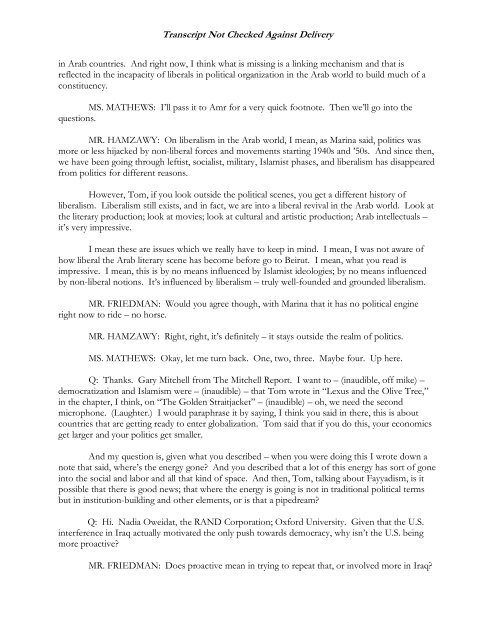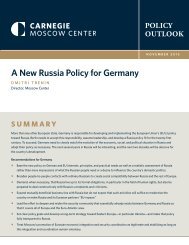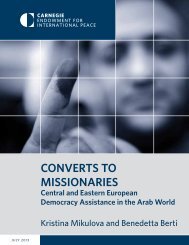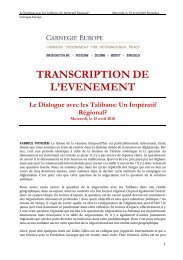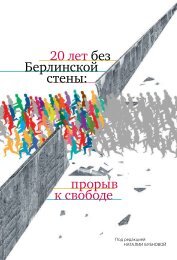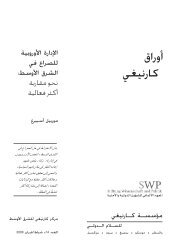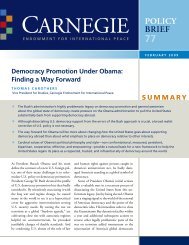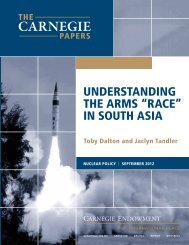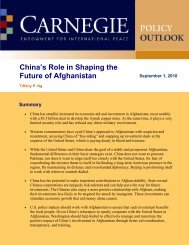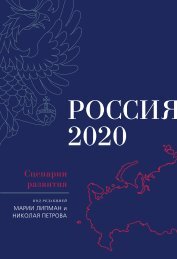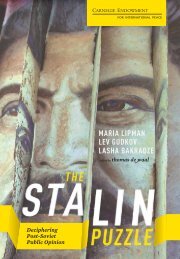getting to pluralism: political actors in the arab world - Carnegie ...
getting to pluralism: political actors in the arab world - Carnegie ...
getting to pluralism: political actors in the arab world - Carnegie ...
Create successful ePaper yourself
Turn your PDF publications into a flip-book with our unique Google optimized e-Paper software.
Transcript Not Checked Aga<strong>in</strong>st Delivery<br />
<strong>in</strong> Arab countries. And right now, I th<strong>in</strong>k what is miss<strong>in</strong>g is a l<strong>in</strong>k<strong>in</strong>g mechanism and that is<br />
reflected <strong>in</strong> <strong>the</strong> <strong>in</strong>capacity of liberals <strong>in</strong> <strong>political</strong> organization <strong>in</strong> <strong>the</strong> Arab <strong>world</strong> <strong>to</strong> build much of a<br />
constituency.<br />
MS. MATHEWS: I’ll pass it <strong>to</strong> Amr for a very quick footnote. Then we’ll go <strong>in</strong><strong>to</strong> <strong>the</strong><br />
questions.<br />
MR. HAMZAWY: On liberalism <strong>in</strong> <strong>the</strong> Arab <strong>world</strong>, I mean, as Mar<strong>in</strong>a said, politics was<br />
more or less hijacked by non-liberal forces and movements start<strong>in</strong>g 1940s and ’50s. And s<strong>in</strong>ce <strong>the</strong>n,<br />
we have been go<strong>in</strong>g through leftist, socialist, military, Islamist phases, and liberalism has disappeared<br />
from politics for different reasons.<br />
However, Tom, if you look outside <strong>the</strong> <strong>political</strong> scenes, you get a different his<strong>to</strong>ry of<br />
liberalism. Liberalism still exists, and <strong>in</strong> fact, we are <strong>in</strong><strong>to</strong> a liberal revival <strong>in</strong> <strong>the</strong> Arab <strong>world</strong>. Look at<br />
<strong>the</strong> literary production; look at movies; look at cultural and artistic production; Arab <strong>in</strong>tellectuals –<br />
it’s very impressive.<br />
I mean <strong>the</strong>se are issues which we really have <strong>to</strong> keep <strong>in</strong> m<strong>in</strong>d. I mean, I was not aware of<br />
how liberal <strong>the</strong> Arab literary scene has become before go <strong>to</strong> Beirut. I mean, what you read is<br />
impressive. I mean, this is by no means <strong>in</strong>fluenced by Islamist ideologies; by no means <strong>in</strong>fluenced<br />
by non-liberal notions. It’s <strong>in</strong>fluenced by liberalism – truly well-founded and grounded liberalism.<br />
MR. FRIEDMAN: Would you agree though, with Mar<strong>in</strong>a that it has no <strong>political</strong> eng<strong>in</strong>e<br />
right now <strong>to</strong> ride – no horse.<br />
MR. HAMZAWY: Right, right, it’s def<strong>in</strong>itely – it stays outside <strong>the</strong> realm of politics.<br />
MS. MATHEWS: Okay, let me turn back. One, two, three. Maybe four. Up here.<br />
Q: Thanks. Gary Mitchell from The Mitchell Report. I want <strong>to</strong> – (<strong>in</strong>audible, off mike) –<br />
democratization and Islamism were – (<strong>in</strong>audible) – that Tom wrote <strong>in</strong> “Lexus and <strong>the</strong> Olive Tree,”<br />
<strong>in</strong> <strong>the</strong> chapter, I th<strong>in</strong>k, on “The Golden Straitjacket” – (<strong>in</strong>audible) – oh, we need <strong>the</strong> second<br />
microphone. (Laughter.) I would paraphrase it by say<strong>in</strong>g, I th<strong>in</strong>k you said <strong>in</strong> <strong>the</strong>re, this is about<br />
countries that are <strong>gett<strong>in</strong>g</strong> ready <strong>to</strong> enter globalization. Tom said that if you do this, your economics<br />
get larger and your politics get smaller.<br />
And my question is, given what you described – when you were do<strong>in</strong>g this I wrote down a<br />
note that said, where’s <strong>the</strong> energy gone? And you described that a lot of this energy has sort of gone<br />
<strong>in</strong><strong>to</strong> <strong>the</strong> social and labor and all that k<strong>in</strong>d of space. And <strong>the</strong>n, Tom, talk<strong>in</strong>g about Fayyadism, is it<br />
possible that <strong>the</strong>re is good news; that where <strong>the</strong> energy is go<strong>in</strong>g is not <strong>in</strong> traditional <strong>political</strong> terms<br />
but <strong>in</strong> <strong>in</strong>stitution-build<strong>in</strong>g and o<strong>the</strong>r elements, or is that a pipedream?<br />
Q: Hi. Nadia Oweidat, <strong>the</strong> RAND Corporation; Oxford University. Given that <strong>the</strong> U.S.<br />
<strong>in</strong>terference <strong>in</strong> Iraq actually motivated <strong>the</strong> only push <strong>to</strong>wards democracy, why isn’t <strong>the</strong> U.S. be<strong>in</strong>g<br />
more proactive?<br />
MR. FRIEDMAN: Does proactive mean <strong>in</strong> try<strong>in</strong>g <strong>to</strong> repeat that, or <strong>in</strong>volved more <strong>in</strong> Iraq?


